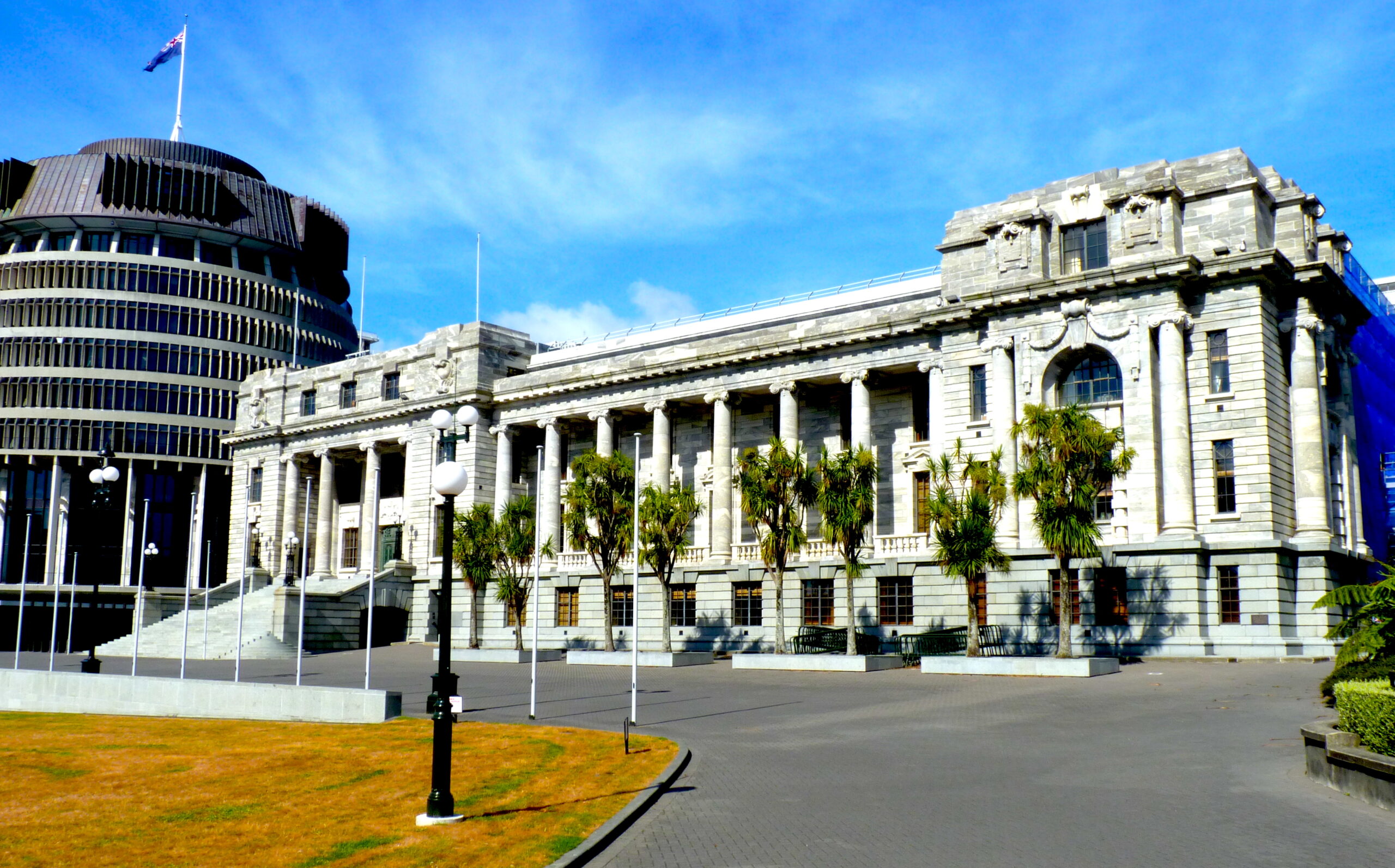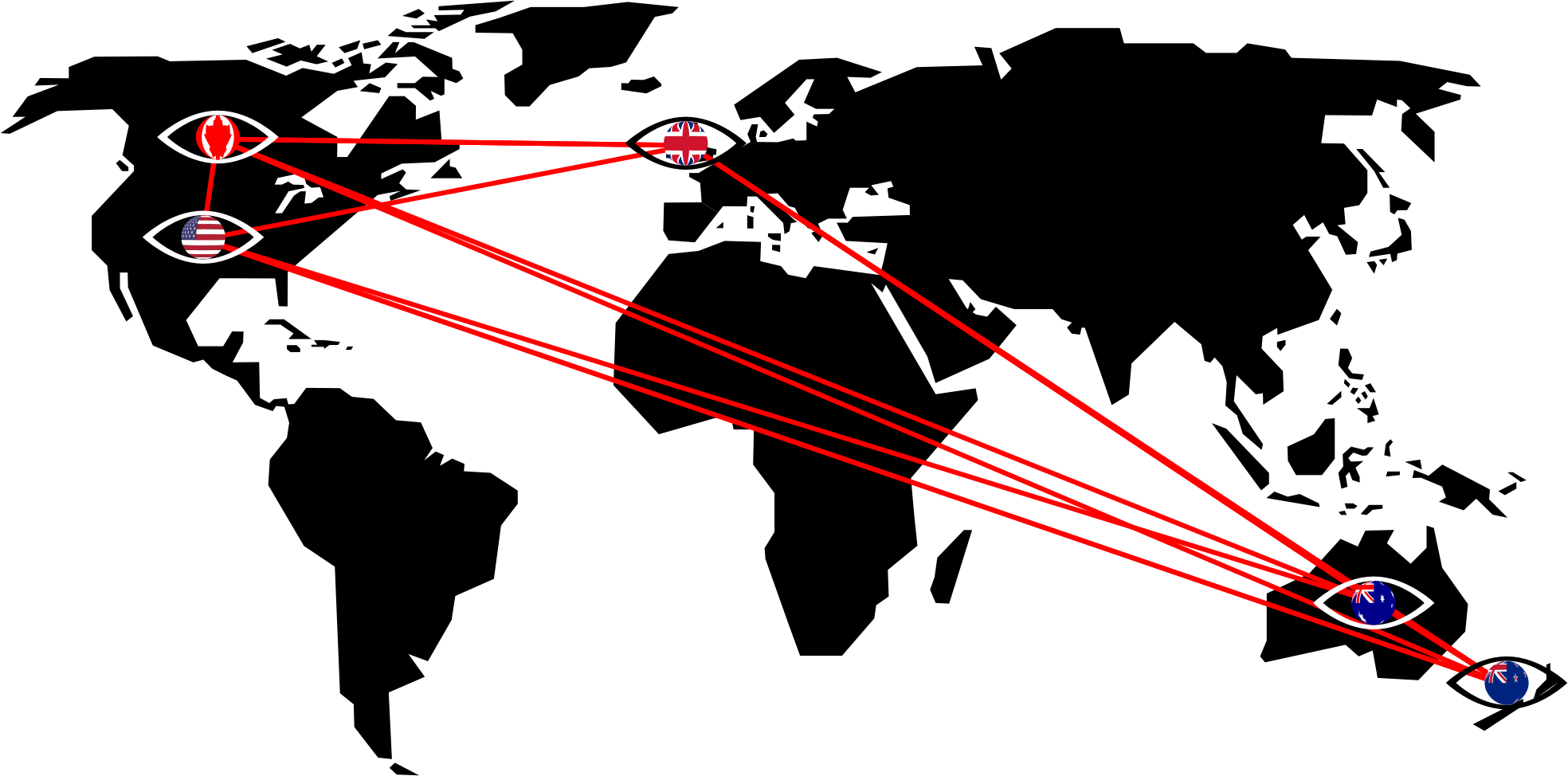New Zealand is set to introduce potentially repressive sedition and espionage laws similar to those of other Western states now gearing up for war with Russia and China, Mick Hall reports.

Parliament House in Wellington. (Michal Klajban, Wikimedia Commons, CC BY-SA 4.0)
By Mick Hall
in Whangarei, New Zealand
Special to Consortium News
 New draconian legislation that criminalizes harming New Zealand’s interests for the benefit of a “foreign power” is a tool of political repression and itself and the product of foreign influence, according to a former government minister.
New draconian legislation that criminalizes harming New Zealand’s interests for the benefit of a “foreign power” is a tool of political repression and itself and the product of foreign influence, according to a former government minister.
“This is definitely Five Eyes coordinated,” Matt Robson told Consortium News, referring to the Western intelligence-sharing apparatus to which New Zealand belongs. “It didn’t originate in New Zealand. The language is from the NATO communiques. This law … is driven by the power that runs the Five Eyes, the United States.”
The Crimes (Countering Foreign Interference) Amendment Bill passed its first reading in Parliament in November, meaning the South Pacific nation is set to introduce potentially repressive sedition and espionage laws similar to those of other Western states now gearing up for war with leading BRICS nations, Russia and China.
The bill, which makes changes to the existing Crimes Act 1961, criminalises “covert, deceptive, corruptive, or coercive conduct” undertaken for a foreign power, and conduct intentionally or recklessly harming New Zealand’s interests. Such interests include its democratic processes, its economy, as well as its defence and security. The maximum prison sentence would be 14 years.
“This is the Foreign Interference Bill,” Robson said, “and yet this bill is coming through foreign powers. We’re being influenced by foreign powers. Five Eyes meetings now cover so many of our ministers, the foreign ministers, defence ministers meet, the immigration ministers — they all meet.”
[See: ‘UK Bill Threaten Journalists With Life in Prison’].
Robson, who served as New Zealand’s former junior foreign minister in Helen Clark’s Labour coalition government, which lasted from 1999-2008, said the legislation was effectively the reintroduction of old sedition laws inherited from the British colonial state. Those laws were used against communists, trade unions and indigenous communities.
“There were long, long battles to get rid of these intimidatory tools,” he said, “and now these are being brought back under a wave of scare-mongering across the Western world about China.”
‘Ought to Have Known’ Basis
The legislation says a person can be prosecuted on the basis that they “ought to have known” they were compromising a New Zealand interest, with a maximum jail time of 1o years.
Since the country’s interests are being tied with the liberal ‘rules-based international order’ and U.S. hegemony in the Asia-Pacific region, there are concerns that the broad reach of the bill will further stifle those who favor ties with China, or otherwise express support for emerging multipolarity and an end to spiralling militarism in the region.
Drafting on the legislation began in early 2023 under the Labour-led government.
During Labour’s two terms in power, leaders Jacinda Ardern and Chris Hipkins incrementally brought the country in closer alignment with NATO and the U.S.’policy of full-spectrum dominance in the region.

NATO Secretary General Jens Stoltenberg and Jacinda Ardern in Brussels, August 2019. (NATO, Flickr, CC BY-NC-ND 2.0)
Both leaders attended NATO’s annual meetings, risking a free trade agreement with China.
Under the current National Party-led coalition, those moves have intensified, with Prime Minister Christopher Luxon signalling an intent to join the techno-military “Pillar II,” the anti-China nuclear submarine dimension of AUKUS, the security arrangement among Australia, the U.K. and U.S.
[See: Opening the Devil’s Door in Asia-Pacific]
After the bill passed its first reading, Justice Minister Paul Goldsmith said:
“This legislation will help to ensure that our criminal law is fit for purpose to address this harmful activity and will better equip agencies to hold people to account.”

Luxon meeting with NATO Secretary General Jens Stoltenberg in Washington in July. (NATO, Flickr, CC BY-NC-ND 2.0)
However, many like Robson believe the bill is highly politicised and set to make society significantly less open, impinging on freedom of expression and association — key freedoms enshrined in the country’s Bill of Rights.
“It’s not to protect me or you or ordinary people. It’s to protect the state’s narrative on any particular question,” he said.
“We have the intelligence services telling us there are Chinese officials threatening, blackmailing, intimidating, yet these are all crimes, they’re on the statute books already. And nobody has been brought to court. You can also withdraw their ambassador, call in their ambassador. There are plenty of tools already. This bill is really about intimidating the New Zealand public.”
Over the past number of years, the New Zealand public has been fed NATO narratives of China posing a threat to Western values as a strategic competitor instead of playing a valuable role as its top trading partner. China’s actions have been depicted as hostile to the country’s democratic norms and provision of human rights.
National Intelligence Threat Reports

Rendering of the “Five Eyes” intelligence network that includes Australia, Canada, New Zealand, the U.K., the U.S. (@GDJ, Openclipart)
The New Zealand Security and Intelligence Service’s (New ZealandSIS) annual “threat environment’ report, launched in 2023, has been a primary vehicle for this message. It has warned of increased foreign interference as a consequence of intensified geopolitical competition in the region. The message and themes are being amplified by government ministers and the media, following the trend in other Five-Eyes nations.
The Australian Security Intelligence Organisation (ASIO) releases a similar annual threat report, which in February claimed Australia was facing its highest-ever threat from espionage and foreign interference. It claimed a former politician “sold out” Australia to a foreign intelligence service and that the agency let the alleged spy ring know their cover had been blown.
The country brought in its own foreign interference laws modelled on the U.S. in 2018.
In June, a parliamentarian report in Canada, based largely on claims by the Canadian Security and Intelligence Service (CSIS), said unnamed MPs were “semi-witting or witting” participants in foreign interference and pointed to involvement by China.
This year’s report emphasised that the biggest threats to national security came from within, with intentional or unintentional harm caused by people in positions of trust in public or private organisations posing a risk to national security. Espionage, unauthorised disclosure of information and foreign interference are flagged as serious concerns.
Please Support CN’s
Winter Fund Drive!![]()
“What we mean by insider threat is an individual who may have access to an organisation’s information, their systems, their facilities who can then use that trusted position to act in a way that harms the organisation,” New ZealandSIS Director-General of Security Andrew Hampton said in the report.
Critics like Helen Clark have previously pointed to the partisan nature of the report, designed to push a more securitised political environment, including signing up to AUKUS. The foreign interference bill is part of that emerging architecture.

From left, Australian Prime Minister Anthony Albanese, U.S. President Joe Biden and U.K. Prime Minister Rishi Sunak in an Diego to celebrate the AUKUS partnership in March 2023. (White House/Adam Schultz)
The bill’s distinction between intentional and reckless, as well as leaving it up to interpretation as to whether the accused “ought” to have known they were engaging in conduct with a foreign power, alarms Robson.
The Auckland-based lawyer says the danger of being convicted even in the absence of intent to commit any offence will leave citizens like academics and journalists second-guessing their words and actions and the people with whom they speak.
The New ZealandSIS report this year highlighted supposed pressures New Zealand-based academics faced from foreign governments, either to publish or avoid publishing material or speaking on certain topics.
Robson says the bill will create the very issues the government states it seeks to tackle and it will not address interference from the likes of Israel or the U.S. itself.
“An academic who publishes something which is against a government statement — and governments in New Zealand have been known to lie — may think twice about publishing a critical article, perhaps worry about a research trip abroad, not wanting to be labelled as influenced and dodgy,” he said.
The New Zealand Ministry of Foreign Affairs (MFAT) and Ministry of Justice jointly briefed foreign ambassadors in November on the bill, reassuring them of their diplomatic protections.
A briefing document stated that expressing views and exercising any freedom in New Zealand would not in itself constitute a criminal act under the bill, something the New ZealandSIS has been keen to argue.
It listed three ways a criminally liable person could benefit a foreign power under the new law — supporting its intelligence agency; enhancing its political, economic or military capacity or influence; or advancing its coercive influence over people in or outside of New Zealand.
The bill also clarifies who owes allegiance to New Zealand and who is therefore liable to prosecution. To be subject to the law, you do not need to be a New Zealand citizen or have sworn allegiance to the country. The briefing document says those who “previously owed allegiance to New Zealand (for example, living in New Zealand) and whose family or living arrangements indicate an enduring connection to New Zealand” can be prosecuted. The person charged need not be living in New Zealand at the time of the offence either.
A general Ministry of Justice policy explanation of the bill shows it makes whistleblowing and the reporting of unauthorised release of government information more fraught, extending the scope of offences related to the possession or sharing of such material. It expands the number of public entities covered by legislation; puts military tactics, procedures and techniques within the scope of existing laws; and extends the offences to cover “formerly government information” deemed to prejudice the security or defence of New Zealand.
The bill also extends existing warrantless search power contained in the Search and Surveillance Act 2012, allowing it to investigate such alleged offending.
Thomas Beagle, chairperson for the New Zealand Council for Civil Liberties, told Consortium News he also had concerns that legitimate political activism could fall under the scope of providing assistance to a foreign power while damaging New Zealand’s interests.
“While this theoretically only applies when aiding a foreign power, it seems that this could also include working internationally with members of political parties that are aligned on issues of interest to New Zealanders,” he said.
“An obvious example would be people engaged in environmental protection who work with people overseas who are also involved with environmental politics, and this could be, and has been, argued to harm New Zealand’s economic interests. As such it obviously risks being in breach of the government’s obligations under the New Zealand Bill of Rights Act to protect freedom of expression and freedom of association. New Zealanders clearly have the right to differ with the government of the day on what New Zealand’s interests are.
At a minimum the bill should be amended to clearly exclude any such limit on the ability of New Zealanders to express themselves and work for political change.”
His organisation was concerned the legislation would also increase warrantless search powers by police.
“While not wanting to defend the current search warrant system too strongly, it still provides some brake on the misuse of search powers and shouldn’t be discarded lightly,” he said.
The New Zealand Ministry of Justice did not respond to a request for comment by the time of publication.
The bill, which has bipartisan support among the major parties, is open to public submissions until Jan. 16.
Mick Hall is an independent journalist based in New Zealand. He is a former digital journalist at Radio New Zealand (RNew Zealand) and former Australian Associated Press (AAP) staffer, having also written investigative stories for various newspapers, including the New Zealand Herald.
Views expressed in this article may or may not reflect those of Consortium News.
Please Support CN’s
Winter Fund Drive!![]()
Make a tax-deductible donation securely by credit card or check by clicking the red button:


Peasant, be thankful for your crust of bread.
The American ‘Intelligence Community’ is trying to do to the rest of the five eyes what that pesky 1st amendment prevents them from doing at home.
The UK, Australia, New Zealand and Canada don’t have a 1st amendment and their constitutions aren’t written using ‘negative rights’ that restrict the actions of government rather than empowering government. Nor does the concept of ‘natural rights’ that no government has the right to interfere with occur in their governing documents. First they come for the guns, which the Anglophone countries outside the USA have already completed (with that pesky 2nd amendment preventing it from happening in America), then they come for free speech. After that, it’s just a matter of time until you end up with authoritarian fascism where government and business interests merge and exercise control over all aspects of life within it’s borders.
This is spookily similar to the “Sedition” charge
Julian Assange eventually beat…
(Pick your 5 eyes nation of origin!)